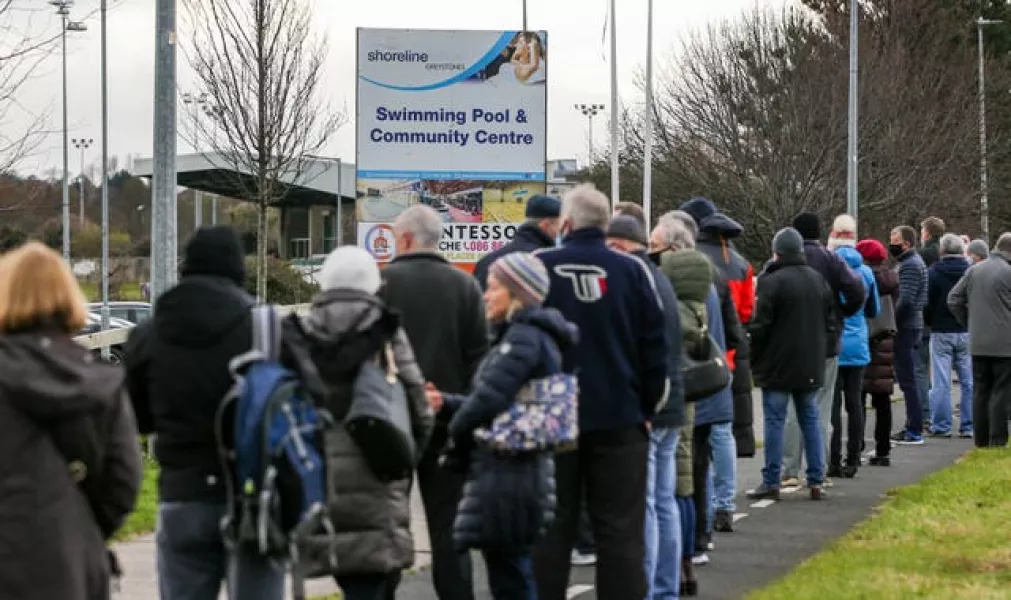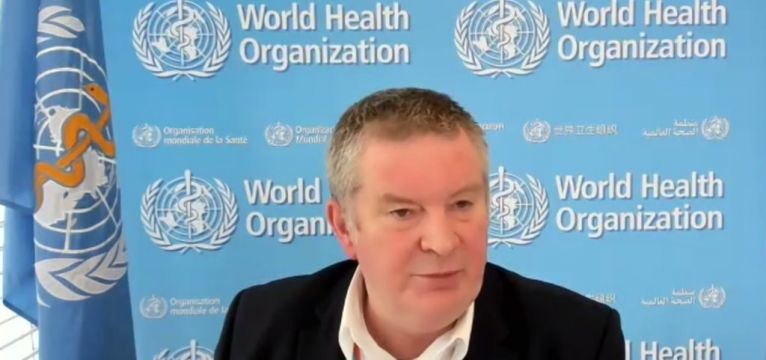A drive in transmission of the Omicron variant will “fill up the hospitals and the ICUs”, a global health leader has warned.
Dr Mike Ryan, executive director of World Health Organisation (WHO) health emergencies programme, said even if Omicron turns out to be a milder disease, the rising number of cases will lead to more people in hospital.
Dr Ryan told an Irish Aid webinar, hosted by the Institute of International and European Affairs (IIEA), that he is concerned about unvaccinated people in every country.
It comes after health chiefs in Ireland said that the Omicron variant likely accounts for 11 per cent of new Covid-19 cases in the country.
On #Omicron, @DrMikeRyan says "we need to get ready from a social and public health perspective - think back to India and Brazil and the capacity issues, if we end up with millions and millions of cases of Omicron, we could end up back in a similar situation". pic.twitter.com/l293JyT6nv
Advertisement— IIEA (@iiea) December 14, 2021
Ireland has had 18 confirmed cases associated to the variant.
Speaking at the briefing, Dr Ryan said: “There’s no doubt that the rising number and the force of infection will generate more hospitalisations in the coming weeks, just the sheer weight of numbers will will generate that.
“What I’m most concerned about right now today, is the fact that there are unvaccinated people in every country, who are at high risk.
“People have moved away from applying even the most basic measures to protect themselves and others, be it government policy or individual behaviour, in terms of mask wearing, avoiding crowded places, in terms of handwashing, in terms of ventilated spaces, all of those issues.
“We are likely to drive transmission and have huge numbers of cases and even if Omicron turns out to be a milder disease, if we generate millions and millions and millions of cases, we will fill the hospitals up, we will fill the ICUs up.
“So we need to refocus on public health and social measures, vaccinate the unvaccinated.”
He urged hospitals to get ready now, and assess its workforce, clinical management and triage.
“Look at its oxygen and other supplies. Look at PPE for its health workers,” he added.
“Because whatever happens, a wave of Omicron, whether it’s less virulent or not, will generate pressure in the health system.”
He also said that specific groups in the population need to get the booster jab, particularly older people or those with underlying conditions who may have lost some protection.
He added: “Everything in this response so far has been a little bit about people looking for silver bullets, looking for unicorns, the perfect answers. They don’t exist.
“What has worked through this pandemic is layered, risk-oriented, evidence-based, consistent advice to people, support the communities – that’s the only way out of this.
“We can’t vaccinate our way out of this. We can’t lockdown our way out of this.”
Colm Brophy, Minister for Overseas Development Aid and Diaspora, said that some time was lost in the global response to Covid “due to populist government responses”.
He said that responding to a pandemic has to be “inclusive and multilateral”.
“We unfortunately, I think in the world through various governments, which you could maybe have historically relied on the past, which treated the the start to Covid in a very populist way in terms of response,” the Fine Gael TD Added.
“We lost a lot of time and a lot of ground I think as an international community in terms of how we would respond to Covid.
“What we need now is to put in place that structure that looks at all of the regulations, how you prevent pandemic, as well as how you treat a pandemic.”

Dr Ryan also praised Ireland’s vaccination programme. He said that while there have been criticisms of its rollout, there remains a “very high level of trust” in the Government.
“There’s an there’s an open debate, there’s open media, there’s questioning,” he added. “But ultimately, at its core, I believe people in Ireland believe the Government is trying to help.
“They might not like the way it’s trying to help them, but it’s trying to help them. That is not a relationship that all governments have with their population.
“When you’re in areas of extreme poverty and urban degradation, and exploitation and migration, and all of that put together and then you come in to populations who’ve had no health, no assistance, no development, no equity for decades and decades.
“And you say ‘here we are, we’re come to save you all now’.
"Those who are vaccine hesitant should not be criticised, but they need to be engaged with - through mediums they trust, communicators and influencers in their networks who they will listen to. We have to get the right messages in the right way to those people" - @DrMikeRyan pic.twitter.com/hMBljHFBdn
— IIEA (@iiea) December 14, 2021
“It’s not just about health literacy. It’s about a much deeper issue, which is who you trust.”
He also said that people who have genuine hesitancy to get vaccinated should not be criticised.
“People can be vaccine-hesitant for any number of reasons. Our job in the public sector is to engage with those people and engage with them with influencers and communicators who they trust,” Dr Ryan added.
“Governments need to learn to branch out and open up and involve civil society, involve non-governmental organisations in that process of trust building.”







